people的用法总结
40个英语介词用法总结
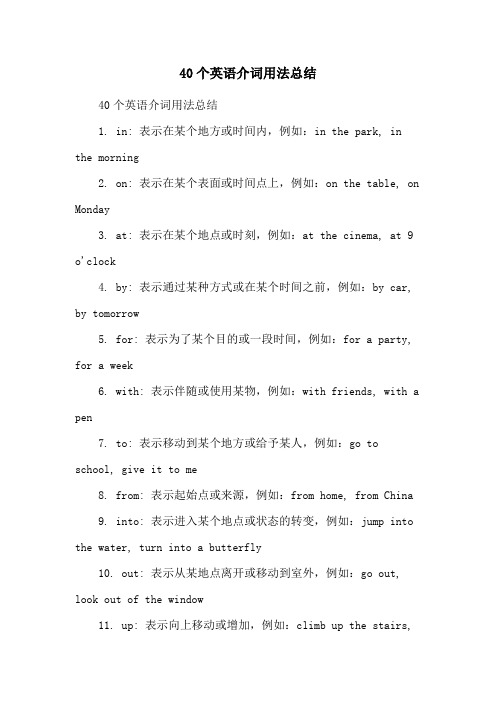
40个英语介词用法总结40个英语介词用法总结1. in: 表示在某个地方或时间内,例如:in the park, in the morning2. on: 表示在某个表面或时间点上,例如:on the table, on Monday3. at: 表示在某个地点或时刻,例如:at the cinema, at 9 o'clock4. by: 表示通过某种方式或在某个时间之前,例如:by car, by tomorrow5. for: 表示为了某个目的或一段时间,例如:for a party, for a week6. with: 表示伴随或使用某物,例如:with friends, with a pen7. to: 表示移动到某个地方或给予某人,例如:go to school, give it to me8. from: 表示起始点或来源,例如:from home, from China9. into: 表示进入某个地点或状态的转变,例如:jump into the water, turn into a butterfly10. out: 表示从某地点离开或移动到室外,例如:go out, look out of the window11. up: 表示向上移动或增加,例如:climb up the stairs,wake up12. down: 表示向下移动或减少,例如:walk down the hill, calm down13. about: 表示关于某事或在某个范围内,例如:talk about the movie, wander about the city14. off: 表示离开或关闭,例如:get off the bus, turnoff the lights15. on: 表示打开或激活,例如:turn on the TV, switch on the computer16. over: 表示越过或在某地上方,例如:jump over the fence, fly over the city17. under: 表示在某物下面或被控制或影响,例如:hide under the bed, live under his rules18. with: 表示具有某种特征或和某人一起做某事,例如:a man with blue eyes, dance with me19. without: 表示没有某物或在缺乏某物的情况下,例如:go without food, live without regret20. by: 表示通过某种方式,例如:learn by doing, go by bus21. through: 表示穿过某物或完成某事,例如:walk through the door, go through the documents22. across: 表示横穿某物或在某个范围内,例如:swimacross the river, all across the world23. between: 表示在两个事物之间或在某个时间段,例如:choose between two options, between 9 and 10 o'clock24. among: 表示在三个或三个以上事物之间或在某群人中,例如:share among friends, discuss among colleagues25. around: 表示在周围或在某个时间点附近,例如:walk around the park, around midnight26. through: 表示通过某事物或在某段时间内,例如:read through the book, work through the night27. against: 表示反对或靠在某物上,例如:fight against injustice, lean against the wall28. for: 表示代表或支持某人或某事,例如:vote for a candidate, fight for freedom29. towards: 表示朝向某个方向或对某人有好感,例如:walk towards the beach, feel towards someone30. within: 表示在某个时间或范围内,例如:arrive within an hour, within the city limits31. beyond: 表示超出某个界限或超过某个程度,例如:beyond expectations, beyond the horizon32. along: 表示沿着某个路线或伴随某人一起,例如:walk along the street, sing along with the song33. above: 表示在某物之上或高于某个程度,例如:flyabove the clouds, above average34. below: 表示在某物之下或低于某个程度,例如:swim below the surface, below freezing35. beside: 表示在某物旁边或和某人一起,例如:sit beside me, beside the lake36. near: 表示在某物附近或接近某个时间,例如:live near the beach, near the end37. past: 表示经过某个地点或在某个时间之后,例如:walk past the store, past midnight38. around: 表示在周围或大约某个数量,例如:look around the room, around 20 people39. after: 表示在某个时间之后或追求某人或某事,例如:after dinner, run after the dog40. before: 表示在某个时间之前或在某个事件之前,例如:before sunrise, before the meeting这些介词是英语中常用的一些基本介词,它们在表达地点、时间、方式等方面起到了重要的作用。
people的单复数的用法

people的单复数的用法单词“people”是一个不可数名词,表示“人们”或“民族”,其本身没有复数形式。
然而,在实际使用中,我们还是可以通过一些方式来表达复数的含义,具体如下:1. 使用“peoples”:在一些特定的语境中,我们可以使用“peoples”来表示多个民族或多个文化群体。
比如:the indigenous peoples of Africa(非洲的土著民族)或the peoples of the world(世界各民族)。
2.使用具体的计数词:为了表达数量上的复数含义,我们可以在“people”前面加上具体的计数词,如“a few”(几个)、“several”(几十个)、“many”(许多)、“millions of”(数百万)等。
例如:There are millions of people living in the city(城市里有数百万人居住)。
3.使用复数形式的名词:当我们需要指代具体的人们或一些群体时,可以使用名词的复数形式来表示。
比如:the rich people(富人们)、the young people(年轻人们)、the British people(英国人民)等。
4.使用代词:为了指代或描述多个人,我们可以使用人称代词的复数形式,如“they”(他们)、“them”(他们,宾格)等。
例如:They are happy (他们很快乐)。
请注意,在很多情况下,“people”作为一个不可数名词,用于指代“全体人类”或“大众”,而不特指一些群体或具体的人们。
此外,还有一些相关词汇需要注意:1. persons:“persons”是“person(人)”的复数形式,它更强调每个个体的独立性,一般用于正式场合或法律文件中。
例如:Three persons were injured in the accident(有三个人在事故中受伤)。
2. peoples vs. people:总结来说,尽管“people”本身没有复数形式,但我们可以通过使用具体的计数词、复数形式的名词、代词等方式来表达其复数含义,并且需要根据具体语境选择合适的表达方式。
动词的分类及用法总结
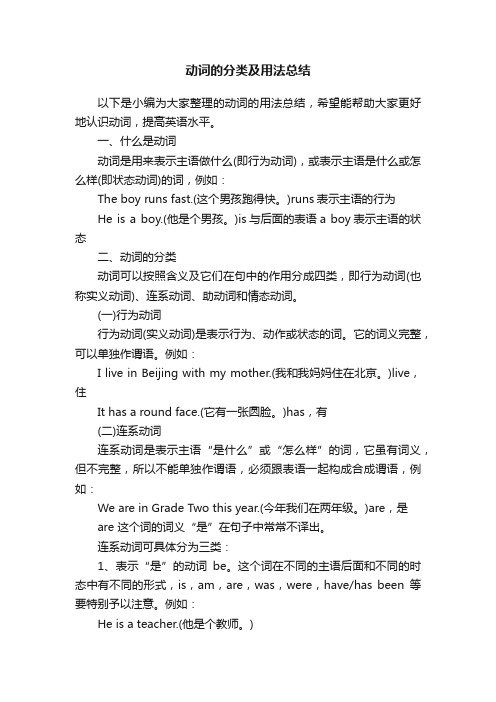
动词的分类及用法总结以下是小编为大家整理的动词的用法总结,希望能帮助大家更好地认识动词,提高英语水平。
一、什么是动词动词是用来表示主语做什么(即行为动词),或表示主语是什么或怎么样(即状态动词)的词,例如:The boy runs fast.(这个男孩跑得快。
)runs表示主语的行为He is a boy.(他是个男孩。
)is与后面的表语a boy表示主语的状态二、动词的分类动词可以按照含义及它们在句中的作用分成四类,即行为动词(也称实义动词)、连系动词、助动词和情态动词。
(一)行为动词行为动词(实义动词)是表示行为、动作或状态的词。
它的词义完整,可以单独作谓语。
例如:I live in Beijing with my mother.(我和我妈妈住在北京。
)live,住It has a round face.(它有一张圆脸。
)has,有(二)连系动词连系动词是表示主语“是什么”或“怎么样”的词,它虽有词义,但不完整,所以不能单独作谓语,必须跟表语一起构成合成谓语,例如:We are in Grade Two this year.(今年我们在两年级。
)are,是are 这个词的词义“是”在句子中常常不译出。
连系动词可具体分为三类:1、表示“是”的动词be。
这个词在不同的主语后面和不同的时态中有不同的形式,is,am,are,was,were,have/has been等要特别予以注意。
例如:He is a teacher.(他是个教师。
)He was a soldier two years ago.(两年前他是个士兵。
)We are Chinese.(我们是中国人。
)2、表示“感觉”的词,如look(看起来),feel(觉得,摸起来),smell(闻起来),sound(听起来),taste(尝起来)等,例如:She looked tired.(她看一去很疲劳。
)I feel ill.(我觉得不舒服。
名词的用法总结
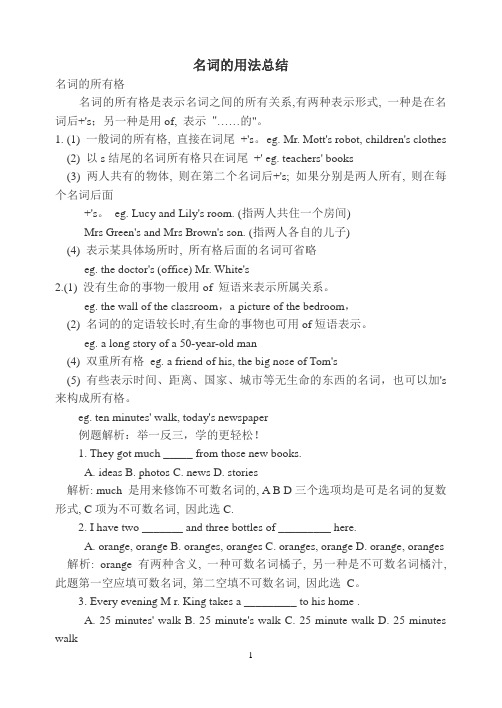
名词的用法总结名词的所有格名词的所有格是表示名词之间的所有关系,有两种表示形式, 一种是在名词后+'s;另一种是用of, 表示"……的"。
1. (1) 一般词的所有格, 直接在词尾+'s。
eg. Mr. Mott's robot, children's clothes(2) 以s结尾的名词所有格只在词尾+' eg. teachers' books(3) 两人共有的物体, 则在第二个名词后+'s; 如果分别是两人所有, 则在每个名词后面+'s。
eg. Lucy and Lily's room. (指两人共住一个房间)Mrs Green's and Mrs Brown's son. (指两人各自的儿子)(4) 表示某具体场所时, 所有格后面的名词可省略eg. the doctor's (office) Mr. White's2.(1) 没有生命的事物一般用of 短语来表示所属关系。
eg. the wall of the classroom,a picture of the bedroom,(2) 名词的的定语较长时,有生命的事物也可用of短语表示。
eg. a long story of a 50-year-old man(4) 双重所有格eg. a friend of his, the big nose of Tom's(5) 有些表示时间、距离、国家、城市等无生命的东西的名词,也可以加's 来构成所有格。
eg. ten minutes' walk, today's newspaper例题解析:举一反三,学的更轻松!1. They got much _____ from those new books.A. ideasB. photosC. newsD. stories解析: much 是用来修饰不可数名词的, A B D三个选项均是可是名词的复数形式, C项为不可数名词, 因此选C.2. I have two _______ and three bottles of _________ here.A. orange, orangeB. oranges, orangesC. oranges, orangeD. orange, oranges解析: orange 有两种含义, 一种可数名词橘子, 另一种是不可数名词橘汁, 此题第一空应填可数名词, 第二空填不可数名词, 因此选C。
英语中man,people,person的用法区别
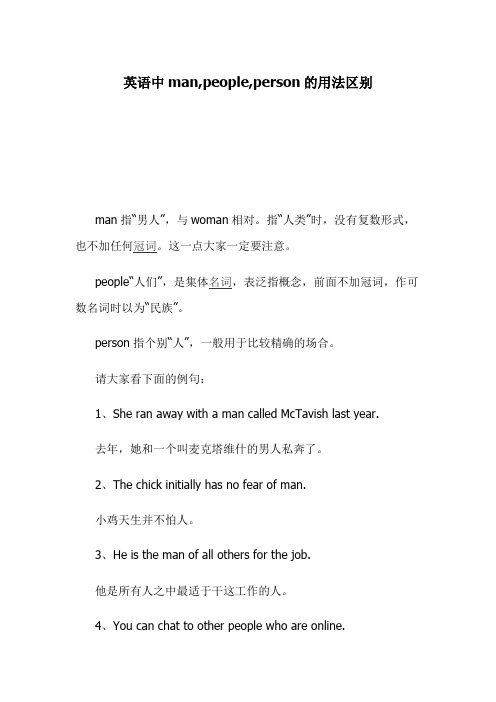
英语中man,people,person的用法区别man指“男人”,与woman相对。
指“人类”时,没有复数形式,也不加任何冠词。
这一点大家一定要注意。
people“人们”,是集体名词,表泛指概念,前面不加冠词,作可数名词时以为“民族”。
person指个别“人”,一般用于比较精确的场合。
请大家看下面的例句:1、She ran away with a man called McTavish last year.去年,她和一个叫麦克塔维什的男人私奔了。
2、The chick initially has no fear of man.小鸡天生并不怕人。
3、He is the man of all others for the job.他是所有人之中最适于干这工作的人。
4、You can chat to other people who are online.你可以和其他在线的人聊天。
5、It's a triumph for the American people.这是美国人民的胜利。
6、Millions of people have lost their homes.数百万人失去了家园。
7、At least one person died and several others were injured. 至少一人死亡,还有几个人受伤。
8、A friend of mine is a very anxious person.我的一个朋友是个非常容易焦虑不安的人。
9、Mary was the first person to think of the idea.玛丽是第一个想到这个主意的人。
what people用法
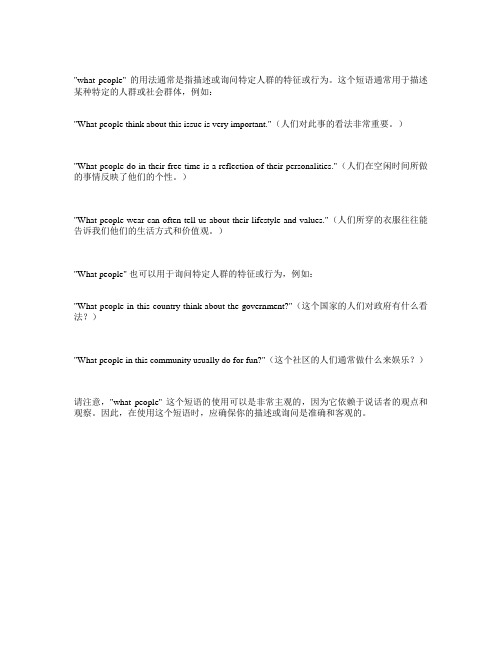
"what people" 的用法通常是指描述或询问特定人群的特征或行为。
这个短语通常用于描述某种特定的人群或社会群体,例如:
"What people think about this issue is very important."(人们对此事的看法非常重要。
)
"What people do in their free time is a reflection of their personalities."(人们在空闲时间所做的事情反映了他们的个性。
)
"What people wear can often tell us about their lifestyle and values."(人们所穿的衣服往往能告诉我们他们的生活方式和价值观。
)
"What people" 也可以用于询问特定人群的特征或行为,例如:
"What people in this country think about the government?"(这个国家的人们对政府有什么看法?)
"What people in this community usually do for fun?"(这个社区的人们通常做什么来娱乐?)
请注意,"what people" 这个短语的使用可以是非常主观的,因为它依赖于说话者的观点和观察。
因此,在使用这个短语时,应确保你的描述或询问是准确和客观的。
people的用法总结大全

people的用法总结大全人们(people)是指一个集体或群体中的成员。
1. People可以作为名词单数形式,表示人类的总称。
- 例如:People are social creatures.(人是社会性动物。
)2. People可以作为名词复数形式,表示多个人。
- 例如:Many people attended the concert.(很多人参加了音乐会。
)3. People可以用作不可数名词,表示人口或民族。
- 例如:The people of Japan are known for their politeness.(日本人以他们的礼貌而闻名。
)4. People可以用作动词,表示使人们聚集在一起。
- 例如:The mayor's speech people the square with excited citizens.(市长的演讲吸引了许多激动的市民聚集在广场上。
)5. People可以用作形容词,表示与人类有关的。
- 例如:The people resources in this country are abundant.(这个国家的人力资源丰富。
)6. People还可以与其他词搭配形成复合词,表示不同的人群或群体。
- 例如:young people(年轻人)、old people(老年人)、homeless people(无家可归的人)、disabled people(残疾人)、working people(工人)总结以上,people是一个非常常用的词,既可作为名词,也可作为动词、形容词等。
在不同的上下文中,人们可以使用people来表达不同的意思和概念。
people的用法总结大全
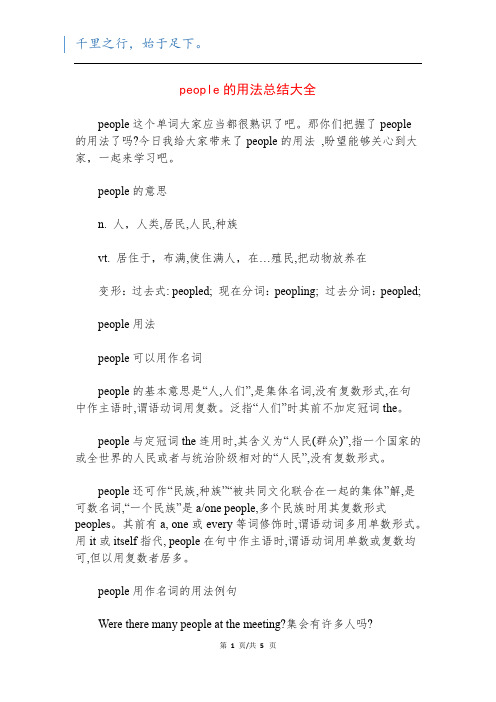
people的用法总结大全people这个单词大家应当都很熟识了吧。
那你们把握了people的用法了吗?今日我给大家带来了people的用法,盼望能够关心到大家,一起来学习吧。
people的意思n. 人,人类,居民,人民,种族vt. 居住于,布满,使住满人,在…殖民,把动物放养在变形:过去式: peopled; 现在分词:peopling; 过去分词:peopled;people用法people可以用作名词people的基本意思是“人,人们”,是集体名词,没有复数形式,在句中作主语时,谓语动词用复数。
泛指“人们”时其前不加定冠词the。
people与定冠词the连用时,其含义为“人民(群众)”,指一个国家的或全世界的人民或者与统治阶级相对的“人民”,没有复数形式。
people还可作“民族,种族”“被共同文化联合在一起的集体”解,是可数名词,“一个民族”是a/one people,多个民族时用其复数形式peoples。
其前有a, one或every等词修饰时,谓语动词多用单数形式。
用it或itself指代, people在句中作主语时,谓语动词用单数或复数均可,但以用复数者居多。
people用作名词的用法例句Were there many people at the meeting?集会有许多人吗?People become uninhibited when they drink.人一喝酒就会变得肆无忌惮。
I think it my duty to serve the people.我认为为人民服务是我的责任。
people可以用作动词people用作动词时意思是“使住着人,使有居民”。
people还可表示“使…布满”,常与with连用,多用于文学语言中,且常用于被动结构。
people用作动词的用法例句Hunters peopled these forests long ago.猎人们很久以前就住在这片森林里。
- 1、下载文档前请自行甄别文档内容的完整性,平台不提供额外的编辑、内容补充、找答案等附加服务。
- 2、"仅部分预览"的文档,不可在线预览部分如存在完整性等问题,可反馈申请退款(可完整预览的文档不适用该条件!)。
- 3、如文档侵犯您的权益,请联系客服反馈,我们会尽快为您处理(人工客服工作时间:9:00-18:30)。
People的用法
1.当People指人(person),或者泛指人们,或者指特定场合的人以及家里人时,它是个无标记的复数名词,无单数形式,更谈不上单复同形。
例如:
There are ten people present.有十个人出席
2.当People作民族解释时,其复数形式为People,也没有单复同形。
例如:The Chinese are hard-working people.中华民族是一个勤劳的民族。
The People是指一个国家的人民或全世界的人民或者与统治阶级相对的人民,它在形式上仍然是单数,但是它的谓语动词,根据概念一致原则,要使用复数。
例如:
The French nobles oppressed the people.法国的贵族压迫人民。
